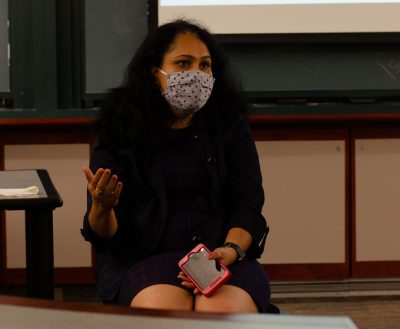Despite the growing representation of diverse communities in leadership positions, Asian communities — and particularly Asian women — remain underrepresented.

A report by Ascend revealed in 2020 that while the executive parity index “of Asian women may be improving, Asian women remain the least likely of all” to hold executive positions.
The Boston University South Asian Student Association hosted a panel last Wednesday titled “South Asian Women in Leadership,” featuring four experts and BU professors from various disciplines who spoke about the significance and struggles of being a South Asian professional in their respective fields.
Ananya Jain, a senior in the College of Arts and Sciences and head of professional relations for SASA, organized the event and said her aim was to bring in women from different fields for the conference.
“I could easily have all women from STEM because STEM is super prioritized in South Asian cultures, but I feel like that would have defeated the purpose of what I wanted to do,” Jain said. “I wanted to show that women can be successful in whatever field they wanted to go in.”
Panelist Deepa Desia, a litigation associate at Fisher Phillips Boston, said at the panel that one challenge many South Asian women face in the workplace is handling microaggressions.
“If you’re in the right place, people will appreciate you for what you have to offer in your work and your productivity and the quality of it,” Desia said. “If you continuously feel uncomfortable in a place … that’s probably not a place you want to be, because you can’t grow there.”
Desia was joined at the Questrom School of Business for the in-person event by Jayita Sarkar, an assistant professor in the Frederick S. Pardee School of Global Studies, Rachana Vajjhala, an assistant professor of musicology in the College of Fine Arts, and Swathi Kiran, associate dean for research at Sargent College of Health and Rehabilitation Sciences and the director of the Aphasia Research Lab at BU.
Desia added that because of the competitive environment fostered by many fields, South Asian women may feel the need to compete with one another, but said she would “actively reject getting into that mindset as much as possible.”
“We understand why this happens because it seems like when most of the table is dominated frankly by white males that there’s not enough seats for the rest of us,” Desia said. “In whatever chosen career you end up pursuing, you’re going to want to be surrounded by people that have a diversity and a variety of experiences and backgrounds and viewpoints.”
Vajjhala said many women of color in leadership positions can face internal struggles because of the model minority myth — the stereotypical view that one minority group is more successful than others, which is often faced by Asian Americans.
“Another facet of the model minority aspect is imposter syndrome, whether it’s internalized or it’s coming from outside,” Vajjhala said. “That’s something that certainly women of color [feel] … and I think we all have a little bit of that, and it certainly haunts me.”
Muskaan Khemani, a senior in CAS and Pardee, said it was interesting to hear from South Asian professors’ about working in academia and the challenges that other South Asian women professionals faced.
“It was nice getting that type of multifaceted recognition of this is what life for us was like, these are barriers you may face, but this is also what the experience may look like,” Khemani said. “It was just nice getting some insight into that.”
Vajjhala also said in an interview after the event that it was important for students to have a support network such as SASA , which was created last Spring.
“We sometimes fall into that trap of just saying a generic ‘Asianness,’ or then we get so specific like ‘this is what we are,’” Vajjhala said, “but I think this idea of South Asian and welcoming in people that might not see themselves represented in other spaces, I think it’s so admirable.”
Jain said listening to the experiences of those with similar backgrounds and experiences can help reassure students about their futures and careers.
“[Kiran] told us to believe in ourselves, and it randomly struck how we often forget to do that,” Jain said. “It’s something we often forget as women in general that we’re not always given a place at the table, but that doesn’t mean we can’t take it.”
























































































































